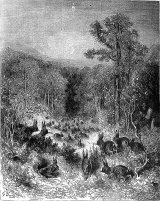The Rabbits
"The Rabbits" is a renowned part of Jean de La Fontaine's collection of fables. It mainly portrays the timid and fearful nature of rabbits, symbolically representing innocent or weak individuals in society. The poet operates in the realm of satire, highlighting social or political contexts of his time to teach moral values and discernment.
TO THE DUKE DE ROCHEFOUCAULD. I Have often said, on seeing How men like animals seem to act, That the lord of the earth, a poor frail being, Is not much better, in fact, Than the beasts whom he rules; and that Nature Has given to each living creature A sense of morality's force, That its origin owes to the one same source. At that witching hour when day In the brown of the eve melts away, Or at that when the long-brooding night Has just lifted its pinions for flight, I climb up some tree, at the edge of a wood, And there, like a Jove, so wise and so good, I startle with fear Some young Rabbits gambolling near. Then the nation of Rabbits, Which, in tune with its habits, With eyes and ears both open wide, Played and browsed on the woodland side, Perfuming its banquets with odours of thyme, With a hurry and scurry, Tails turned in a hurry, Seeks its earth-sheltered burrows (thieves flying from crime.) But five minutes, or so, Have not vanished, when, lo! More gay than before, On the fragrant green floor, A rollicking band, The Rabbits are there, again, under my hand! Ah! do we not in this perceive A picture of the race of men Who, shipwrecked once, will still again The safety of the harbour leave, Risking fresh shipwreck from the selfsame wind? True Rabbits! They, to fortune blind, Entrust their wealth, and all their store! And of this truth take one example more. When stranger dogs pass through some place Where they do not of wont reside, The native dogs at once give chase, With hungry jaws, all opening wide (Fearing that the intruders may Snatch the true owner's food away), And never weary till th' intruders Are safely driven from their borders. Just so with those whom gracious fates Have made the governors of states; And those whom many artful plans Have made much-favoured courtesans; And merchants; men of any kind; In all you'll find this jealous mind. Each one, in his several place, To the intruder grants no grace. Your fine coquettes and authors are Precisely of this character. Woe to the unknown writer who Dares publish something bright and new! Poets forgive you any crime, If you'll not rival them in rhyme. A thousand instances of this I might recite; but well I wish That works should never be too long. Moreover, you should always show You think your readers wise, you know; So now I'll close this song. Ah! you, to whom I owe so much; Whose greatness, and whose modesty Are in exact equality; Who cannot bear that men should touch With praiseful tongues your well-earned fame, Who still will blush with needless shame: You, who scarcely have allowed That I should make my verses proud, And from critics and from time Protect my insufficient rhyme, By heading them with one of those Great names which make our nation's pride, Our France, whose annals long disclose More famous names than all the world beside; Oh, let me tell the universe That you gave me this subject for my verse.
Translation
Translate and read this book in other languages:
Select another language:
- - Select -
- 简体中文 (Chinese - Simplified)
- 繁體中文 (Chinese - Traditional)
- Español (Spanish)
- Esperanto (Esperanto)
- 日本語 (Japanese)
- Português (Portuguese)
- Deutsch (German)
- العربية (Arabic)
- Français (French)
- Русский (Russian)
- ಕನ್ನಡ (Kannada)
- 한국어 (Korean)
- עברית (Hebrew)
- Gaeilge (Irish)
- Українська (Ukrainian)
- اردو (Urdu)
- Magyar (Hungarian)
- मानक हिन्दी (Hindi)
- Indonesia (Indonesian)
- Italiano (Italian)
- தமிழ் (Tamil)
- Türkçe (Turkish)
- తెలుగు (Telugu)
- ภาษาไทย (Thai)
- Tiếng Việt (Vietnamese)
- Čeština (Czech)
- Polski (Polish)
- Bahasa Indonesia (Indonesian)
- Românește (Romanian)
- Nederlands (Dutch)
- Ελληνικά (Greek)
- Latinum (Latin)
- Svenska (Swedish)
- Dansk (Danish)
- Suomi (Finnish)
- فارسی (Persian)
- ייִדיש (Yiddish)
- հայերեն (Armenian)
- Norsk (Norwegian)
- English (English)
Citation
Use the citation below to add this book to your bibliography:
Style:MLAChicagoAPA
"The Rabbits Books." Literature.com. STANDS4 LLC, 2025. Web. 22 Feb. 2025. <https://www.literature.com/book/the_rabbits_2658>.








Discuss this The Rabbits book with the community:
Report Comment
We're doing our best to make sure our content is useful, accurate and safe.
If by any chance you spot an inappropriate comment while navigating through our website please use this form to let us know, and we'll take care of it shortly.
Attachment
You need to be logged in to favorite.
Log In